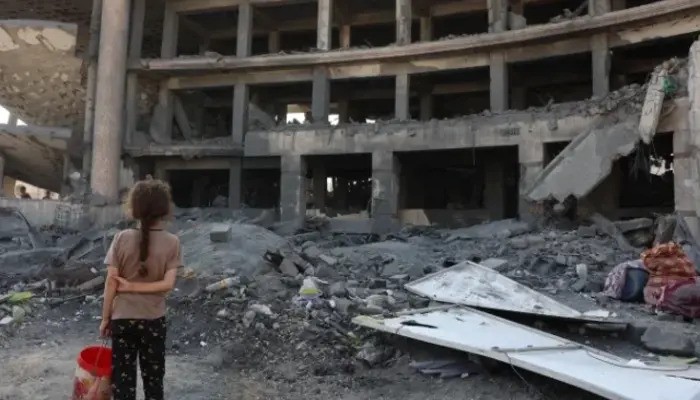The Greater Israel plan announced by Israeli Prime Minister Benjamin Netanyahu has drawn widespread condemnation from Arab and Islamic nations. Foreign ministers of 31 countries, backed by the Arab League, the Organisation of Islamic Cooperation (OIC), and the Gulf Cooperation Council (GCC), denounced the proposal as a direct threat to international law, regional stability, and Arab national security.
Strong Regional Rejection
In a joint statement, the foreign ministers declared that Netanyahu’s remarks reveal “grave disregard” for the principles of international law. They warned that the plan undermines the sovereignty of states and endangers peace in both the Middle East and the wider international community.
Qatar’s Foreign Ministry echoed this stance in its own statement, calling Netanyahu’s words “a blatant and dangerous violation” of established international norms. The condemnation underscored a rare show of unity among Arab and Islamic states, who see the plan as an existential challenge to Palestinian rights and regional stability.
Gaza Under Fire
Even as leaders rejected the Greater Israel plan, violence on the ground in Gaza continued. Israeli strikes early Friday killed at least ten Palestinians, including four children, according to reports from Al-Awda Hospital in Nuseirat. The attack marked yet another grim day in the 21-month-long war that has devastated the enclave.
The United Nations Human Rights Office in the Occupied Palestinian Territory (OHCHR) documented at least 11 incidents since early August in which Israeli forces opened fire on Palestinians attempting to access aid. These attacks killed 46 people, many of whom were guarding or receiving humanitarian supplies.
Read: Israeli Settler Attack Wounds Palestinians as Gaza Faces Starvation, Drone Strikes
Rising Death Toll
Between May 27 and August 13, OHCHR recorded the deaths of at least 1,760 Palestinians killed while seeking aid. Among them, 994 were killed near distribution centers run by the controversial Global Humanitarian Foundation (GHF). The figures highlight the extreme dangers faced by civilians simply trying to secure food and medical assistance.
Images from northern Gaza revealed the aftermath of such attacks: wounded civilians carried away on bicycles, grieving families at hospitals, and the destruction of critical facilities like the Sheikh Radwan Health Centre.
Humanitarian Crisis Deepens
The UN agency UNRWA, which operates health and relief services for Palestinians, has seen several of its facilities damaged or destroyed in the ongoing strikes. On August 6, the Sheikh Radwan Health Centre, run by UNRWA in Gaza City, was heavily damaged by an Israeli airstrike.
Photos from the scene showed Palestinians sifting through rubble and mourning their losses, scenes that have become tragically common. Aid workers warn that the collapse of essential health services could lead to an even more catastrophic humanitarian crisis.
The Scale of the War
According to health authorities in Gaza, Israel’s campaign has now killed more than 61,776 Palestinians and injured at least 154,906 since the war began nearly two years ago. The majority of casualties are women and children, underscoring the civilian cost of the conflict.
These staggering numbers come alongside a growing legal battle. Last November, the International Criminal Court (ICC) issued arrest warrants for Netanyahu and former Defense Minister Yoav Gallant, citing alleged war crimes and crimes against humanity.
International Legal Pressure
Israel also faces proceedings at the International Court of Justice (ICJ), where it stands accused of genocide in Gaza. The combination of ICC warrants and ICJ hearings places unprecedented legal and diplomatic pressure on Tel Aviv.
While Israeli leaders have dismissed the charges as biased, the mounting evidence of civilian casualties and deliberate targeting of aid convoys is fueling international outrage. Arab and Islamic states now view Netanyahu’s Greater Israel plan not only as politically provocative but also as evidence of an expanding territorial agenda pursued through force.
Calls for Action
The statements issued this week reflect more than condemnation. They serve as a call to the broader international community to intervene. Arab and Islamic countries argue that ignoring Netanyahu’s plan and Israel’s ongoing actions risks further destabilizing the Middle East.
With the T20 World Cup less than six months away… (oops sports slip earlier ignore)
The demand is clear: immediate accountability, stronger humanitarian protections, and renewed international efforts to stop the bloodshed.
Looking Ahead
As the war enters its 21st month, Gaza faces worsening conditions, while the political fallout of Netanyahu’s Greater Israel plan spreads across the region. Arab and Islamic states appear determined to confront the proposal on diplomatic and legal fronts, warning that silence will embolden further violations.
The crisis remains unresolved, and the world watches as Gaza’s humanitarian disaster deepens and regional tensions rise.
Follow us on Instagram, YouTube, Facebook,, X and TikTok for latest updates
